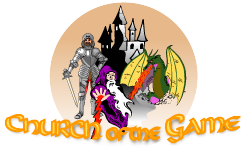The Big Secret
Okay, I am coming clean...
Almost a year ago I GM'd a d20 game based in a smallish town. Their were some strange murders going on, their was a large dark smelly monk running around town, there were some sneaky robed figures robbing homes and businesses, and their was a smuggling problem.
The party nearly killed themselves trying to solve all this. They thought:
The monk was the kingpin of crime, running the smuggling operation.
His minions were were killing the people that knew too much.
They were also looting the homes of those that were too powerful to kill off.
Totally wrong, and since the campaign will never be completed I will reveal the secrets here. First the monk was just a distraction. I didn't have anything planned for him but pressed him into service for a quick mission when only have the group showed up.
The murders were a vary complicated plot.
Day 1:
Martin Roban (the cobbler) dies in the wilderness and becomes a memory eater (from the Creature Collection by Sword and Sorcery Studios) . Memory eaters remember their lives and do not realize they are undead. They return to their jobs and homes only to have family and friends flee in terror. They kill there friends and family. Once these people are consumed it gains some of their memories and the patterns repeats.
Day 3:
Martin returns home and kills his wife Sarah Roban.
Day 4:
Martin returns to work and kills Jacob Wren his apprentice. Jacob Wren become a memory eater as well.
Day 10:
Martin kills William Blythe, Sarah's brother.
Day 12:
Martin kills Kent Lyske, William's employer. Kent Lyske also becomes a memory eater.
Jacob Wren kills Katy, a waitress and former girlfriend.
Day 17:
Kent Lyske kills Brent Lyske his brother and William Blythes landlord.
Day 19:
Martin kills Grant Speary the tanner.
Day 20:
Kent kills Laurence Clavy his former best friend
Day 21:
Jacob kills Cassandra Youge, Katy's best friend
Day 24:
Jacob kills Albert Younge, Cassandras father and Rebecca Younge, Cassandra's mother. Rebecca Younge becomes a memory eater as well.
Martin kills Thomas Banik, customer of Grant Speary.
Day 25:
Kent kills Dennis Carre, Laurence Clavy's brother-in-law
Day 29:
Martin kills Randy Fallmen, associate of Thomas Banik
Kent kills London Lyske, Kent's brother
Jacob kills Mitchell Cooper, Cassandra Younge's boyfriend
Rebeccca kills Geoffry Wilson, Rebecca Younge's boyfriend.
Now to complicate matters the robberies were being committed by ratmen living under the city. They would find out about people who had been killed and then clean out their homes and businesses, so the party only had 2 to 4 days before the evidence would be totally removed. Also many of the murders were not reported the day they happened so the party would have to construct the timeline then find the connection.
They were actually almost onto it, they actually witnessed one of the murders but because they were trying to tie the murders and the robberies to the monk they lost the trail and had to start again.
The ratmen they actually solved that part, if not in the way I anticipated. They decided to stake out the Younge household and managed to surprise some ratmen in the act of robbing the house. They then found he entrance to the catacombs and cleaned them out.
Thinking they had solved the murders they left town and were planning to return. I kept up the murders and the random chance the victim would become a memory eaters. When they returned to town they would have found the town in complete shambles. The town watch and the monk would hold only a small part of town besieged by the masses of undead and pockets of ratmen. Another part of town is held by the crime boss and his family.
Oh and the smuggling problem. That was just something to get them out of town to allow for the Memory Eaters to get started and multiply. So they took a job with the crime lord to deliver a package. It kept them out of town until day 10. I was going to have the smuggling problem slowly deteriorate the economy so that the costs in the town would slowly rise, but that was just an afterthought.





